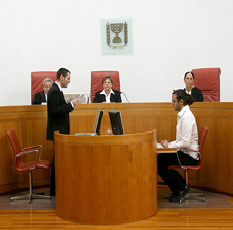
Tabled by: MKs Danny Danon (Likud) and Yariv Levin (Likud).
This proposed amendment to the Basic Law: The Judiciary seeks to substantially limit the ability of human rights and social change organizations to file petitions to the High Court of Justice, thereby limiting the amount of sensitive public issues that reach the Supreme Court. The bill seeks to restrict “public petitioners” – organizations and bodies that file petitions against state authorities even though they are not directly harmed in a certain matter.
One of the conditions set by this bill for filing a petition as a public petitioner is that “there is no one directly harmed by the matter for which the relief is sought, or the party directly harmed has also petitioned the High Court of Justice to seek relief.” According to ACRI’s position paper, submitted to the Minister of Justice, this condition is legitimate when the petition concerns a personal matter and the party affected chooses not to petition the High Court or even opposes the relief sought in the petition. However, the language of this bill is more far-reaching when dealing with petitions or issues that are clearly public issues, concerning the protection of human rights and the rule of law. These are petitions against a policy that is not directed toward a specific, directly affected individual, but rather affects a large group of people. This bill would prevent the filing of petitions regarding matters that would inflict grave and severe harm upon a large group of people from disadvantaged populations, who do not have the capacity to petition or who fear involvement in a legal proceeding.
Concern also arises that this condition seeks to prevent the submission of petitions regarding the constitutionality of laws even before an individual is harmed by them – such as the petition against the Acceptance to Communities Law even before candidates are rejected based on the criteria set in the law, or the petition against the Nakba Law even before the Finance Minister exercises his authority to reduce allocations to a supported body. There is no justification for waiting until the harm actually occurs before examining the constitutionality of a law that infringes on human rights.
Another improper condition proposed in this bill is that a public petitioner be required to list in the petition all the donations it received from a foreign state entity in the preceding three years, including the identity of the donor, the amount of the donation, and the use for which the donation was intended. The explanatory notes to the bill state: “With this information available to the High Court justices, they will be able to ensure that extraneous considerations of biased or hostile bodies not enter the gates of the Supreme Court in the guise of a petition on behalf of the public […] The parameters stipulated in the bill will allow the court to ensure that no foreign bodies or considerations stand behind the public petitioner.” In any case, organizations are obligated to report such donations to the Registrar of Associations, and this information is open and transparent to the public on the organizations’ websites, as well. Such information is irrelevant to the legal deliberation, and implies that organizations are puppets of foreign states that wish to promote their own interests through petitions to the High Court. Nothing is further from the truth than this baseless, unfounded accusation.
This bill continues the campaign to delegitimize human rights organizations and undermine the authority and status of the Supreme Court. Neither the Minister of Justice nor the government should lend a hand to it.
Over the years, the High Court of Justice has issued a range of rulings on legal standing and its restrictions. It adopted tests that allow it to deliberate only petitions that should be deliberated, as they raise issues of signal importance for the safeguarding of human rights and the rule of law. No problem exists here whatsoever that would require the intervention of the legislator, and the enactment of this bill is liable to harm the protection of human rights in Israel.
Status: Bill has been tabled but is currently not being promoted.







